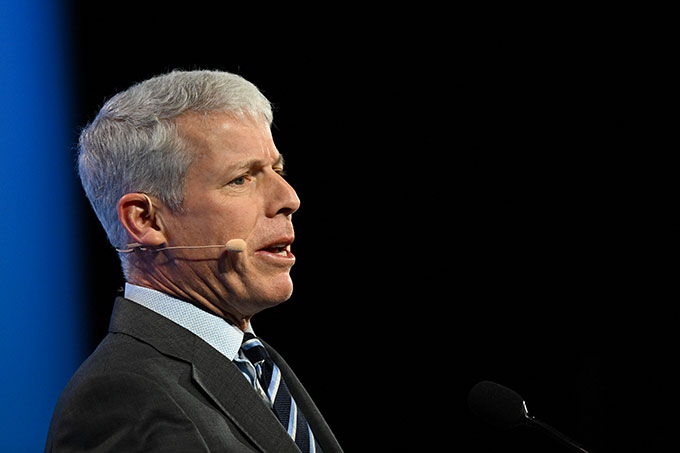President Trump hates federal home appliance regulations as much as President Biden loved them. And now Secretary of Energy Chris Wright has taken the first steps toward blocking the regulatory onslaught the new administration inherited.
The Trump administration should be applauded for trying to get government out of Americans’ homes. But the administration, and Congress, can go further, by ending the Department of Energy’s involvement in appliance regulation entirely.
The Biden administration’s threatened crackdown on gas stoves in 2023 sparked a surprising public backlash. But that didn’t stop Biden’s regulators from targeting nearly everything else that plugs in or fires up around the house: washing machines, refrigerators, furnaces, dishwashers, air conditioners, light bulbs, and water heaters. They even went ahead with a stove regulation, not as burdensome as originally proposed but still bad.
Most of these regulations are Department of Energy (DOE) efficiency standards. The measures are supposed to save consumers money, but several are so extreme that they’ll raise the upfront cost of the appliance. Others compromise appliance quality, performance, choice, and reliability.
For example, the latest standard for electric water heaters will boost the cost of a new model by a DOE-estimated $953 once it takes effect in 2029. Ultra-efficient washing machines cost at least $100 more, according to the agency. The latest light bulb regulation will nearly double the price of a standard bulb. The list goes on—and DOE’s initial cost estimates often turn out to be on the low side.
These rules’ one-size-fits-all nature is especially bad for certain households. For example, the latest furnace regulation forbids the models that are the best replacement options for millions of older homes—the kind disproportionately owned by lower-income Americans. For them, the price boost will likely exceed the agency estimate of $867. Another rule, affecting gas-fired tankless water heaters (the type that warms the water as needed and doesn’t require a storage tank) will render such heaters prohibitively expensive.
Other appliance regulations have degraded performance. Past dishwasher regulations mean that those appliances take two hours or more to complete a normal load of dishes—about twice the time of pre-standards models. Rather than fix problems with existing dishwasher and washing-machine standards, team Biden decided to tighten them yet again.
Federal regulations hit some appliances with a multiagency assault. For example, central air conditioners face costly Biden-initiated Environmental Protection Agency regulations, alongside older DOE ones. As a result, your next central-air-conditioning system may cost several thousand dollars more than the one it replaces.
As with most ill-advised Biden administration regulations, the appliance onslaught was driven by an obsession with climate change. Each final rule included estimates of how much it would reduce greenhouse gas emissions—practically an acknowledgement by Biden’s regulators that consumer well-being was not their only priority.
President Trump is following through on campaign promises to fix lousy appliance regulations, issuing two Day One executive orders changing these rules. One, entitled “Unleashing American Energy,” singles out the need to “safeguard the American people’s freedom to choose from a variety of goods and appliances” and announces an immediate review of all such regulations. Another, “Delivering Emergency Price Relief for American Families and Defeating the Cost of Living Crisis,” directs all agencies to “eliminate counterproductive requirements that raise the costs of home appliances.”
This has culminated in a February 14 announcement from Secretary Wright that the DOE will “postpone the implementation of seven of the Biden–Harris administration’s restrictive mandates on home appliances,” including air conditioners, washer/dryers, light bulbs, and water heaters. The extra time will allow the agency to reconsider these rules. “The people, not the government, should be choosing the home appliances and products they want at prices they can afford,” Wright said.

He’s right, and the DOE should show no mercy in eliminating or modifying needlessly onerous rules. The easiest ones to revise or repeal are the ones Biden pushed out the door in his final months that have yet to go into effect, such as those for tankless water heaters and dishwashers. These could also be rescinded by Congress under the Congressional Review Act, and a few House and Senate bills have been introduced that will do just that.
Changing the many earlier appliance rules will be harder. Environmental groups will doubtless challenge attempts to do so in court, as they did during the first Trump administration.
Addressing bad appliance regulations on an individual basis is a worthwhile fight, but the ultimate goal should be for Congress to sunset the DOE’s appliance meddling entirely. Many appliances have now been subjected to four, five, or even six rounds of successively worse standards. The decades-old appliance standards program has outlived its usefulness, if it ever had any in the first place.
Eliminating appliance regulations would expand product choices. Manufacturers have shown that they will provide ultra-efficient options for consumers who prefer them, and information is widely available to identify such models. Indeed, for every type of appliance, there are models on the market that use less energy than the minimum efficiency levels required by Washington. What these regulations do is force government-preferred choices on everyone, whether it makes sense for them or not.
Pumping the brakes on appliance regulations is necessary to avoid a repeat of the last administration’s excesses. Biden’s hyper-aggressive DOE negated the four years of regulatory restraint during Trump’s first presidency. It would be a gift to the American people if Congress were to prevent future presidents, Democratic or Republican, from meddling again with household appliances.
Top Photo by Monika Skolimowska/picture alliance via Getty Images
City Journal is a publication of the Manhattan Institute for Policy Research (MI), a leading free-market think tank. Are you interested in supporting the magazine? As a 501(c)(3) nonprofit, donations in support of MI and City Journal are fully tax-deductible as provided by law (EIN #13-2912529).















